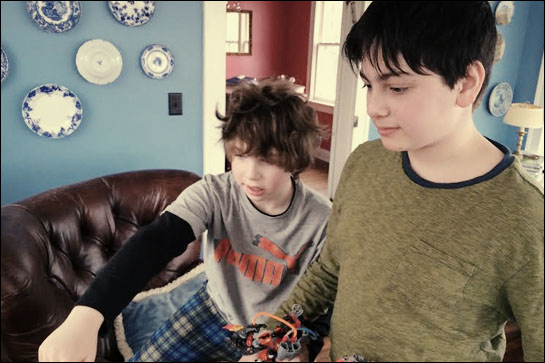Key skill for homeschooling parents: Emotional availability

Today I sifted through drafts of posts I didn’t publish. This is from 2011. The picture up top caught my eye, so I read the post.
Last Friday I spent the day in bed. Well, first I got out of bed, had the kids do chores, and then made breakfast for the Farmer and the kids. But then I went back to bed.
There are only two days a week when we are at home all day. No driving. Friday was one of those days. Usually I force myself to look high-functioning, but usually the Farmer is around all day, and I confess to be influenced by his presence. I don’t want him to see me sleeping all day.
But he had gone to the accountant to do his taxes. So I slept.
I slept from 8am to 1pm. I woke up and went downstairs to see what the kids were doing. They were doing fine, I think. It was sort of a party.
I can’t tell if I’m a crazy, neglectful parent for sleeping or if the kids are resourceful and fun.
It bothers me that the crazy parents don’t know they are crazy. It’s clear to me that very few people know when they are out of their minds in a given area. For example, people who have terrible social skills don’t know they are terrible, because that’s part of the problem. They don’t notice that they are the problem.
The post is cut off by a note from Jay, my editor at that time: “Be more useful.”
Ten years later, as a reader of the post, I find it incredibly useful. I can see that I need scaffolding in order to be my best self. I knew what a good parent does, but unless I had some external forces pushing me in that direction, I did the least I could get away with. Not because I was a terrible person, but because I was overwhelmed from sensory input and tired from poor executive function.
Not a lot has changed since then.
But I have read a lot about parenting since 2011. I know what researchers define as good parenting: emotional availability. It’s not just being present. It’s being present and totally checked in. Not necessarily talking but being ready and willing to talk. Or listen. And care. So watching a soccer game doesn’t necessarily count. Practicing cello doesn’t necessarily count. Making dinner doesn’t necessarily count. What counts is what the child believes you will do if the child wants emotional attention at that second.
Would it have counted that my kids could have come up to my bed and woken me up?
Am I emotionally available right now because I’m sitting next to my son typing? Or am I too consumed with the question of how to use the word woken? So many times I have been stuck on a question like the nuance of past imperfect and can’t get my brain to answer a “Hey, Mom…”
What I really want to do is to be able to shift quickly when the boys want my attention. It’s okay to be in bed all morning, but I need to get out if they need me. It’s okay to obsess over “awoken” versus “waked,” as long as I can stop my brain immediately when my son speaks.
Being emotionally available is hard. It takes a lot of practice. I wish someone had told me to start practicing when they told me to start taking prenatal pills.



Love this
I don’t think emotional availability always has to be on demand. I think it’s okay under many circumstances to defer your children for a time, kindly and gently. “Hey bud, can I check in with you in 5 minutes after I wrap up this thought I’m writing?”
it’s hard, and what would one do to practice? Watch movies? Read? Volunteer at a Crises center?
I like this post as it’s you striving to be as self-aware and the best parent as possible. Nothing has changed since I started reading this blog. You have had more than your fair share of the work and responsibility of providing for and raising your sons. I think it’s your nature to be critical of yourself and especially your performance. The trick is to be more accepting of yourself and know you’re doing your best. Never be your own worst enemy.
The disappointment I had with this post was the one link in it. It prompted me to do some of my own research on the topic of emotional availability. I found the website of Zeynep Biringen, Ph.D. (a professor at Colorado State University (CSU) and licensed as a psychologist in the State of Colorado) which, wait for it, is at emotionalavailability dot com. In fact, it was her method (Emotional Availability Scales) that was used by the researchers in the link in this post. I discovered she has written two books – (Raising a Secure Child: Creating an Emotional Connection Between You and Your Child, (published in 2004 by Penguin) and The Universal Language of Love: Assessing Relationships Through the Science of Emotional Availability) which are described on her Scientific Validation (Research) page and her Products page on her website and are available on Amazon. The reviews on Amazon were very good and gave some good insight into the book’s contents.
Also, there’s an Annenberg Institute for School Reform at Brown University webpage (www dot annenberginstitute (dot) org (forward slash) instruments (forward slash) emotional-availability-scales) that lists peer reviewed studies where the Emotional Availability Scales method developed by Dr. Zeynep Biringen is used. There are two studies on that webpage that have links to autism spectrum disorder.
That’s such great research, Mark. Thank you. At first I was like, hm. Why didn’t I do that research? But honestly, I didn’t even look at the links you sent. Because I’m overwhelmed by the idea of emotional availability. I feel like the only way I survive parenting is to check out. I feel terrible. I notice more and more how much I do it. My kids have pointed out how I’m the only person they know who just walks away mid conversation. It’s true. I do that. I think they must know I can still listen while I walk away. I’m just walking away to find something to occupy myself while I listen. It’s just awful. I can’t believe how long I’ve been doing this. Also, just today Z and I were watching Family Guy at lunch. And it was funny, so when my other son called, I asked Z to pause the show while I picked up the phone. Then, after the phone call, I checked my email, and I never went back to the table. So Z just finished lunch and left the table and we both ignored the fact that I never went back to finish the show. It’s just so messed up how I pretend it doesn’t matter. And then we all normalize that. I’m so incredibly emotionally unavailable that I don’t even want to keep reading research about it.
Also, while I’m freaking out about this, you know that song Cat’s In the Cradle? That’s gonna be me. I’m really scared of that. My kids are gonna do the same thing to me when I’m really old and have nothing to do and they’re adults and preoccupied and I can’t get their attention. And it feels so awful. And it’s so autistic of me to not be able to understand any bad feeling unless I can be the person suffering.
Okay. So Mark, thank you for the research. Now that it’s here, on the blog, I’m that much closer to reading it. Maybe there will be something about how to train people to stop escaping the emotional demands of their children. And everyone else.
Penelope
It sounds like your views are evolving. I think I can remember a post that was titled something like, “it’s not the quality of the time you spend with your kid, it’s the quantity.”
I’m not sure evolving is the write word. Maybe I just torture myself more and more until I make it impossible to meet my own standards and I implode from the stress. With emotional availability as a standard for parenting the parent would need to be both present and checked in. So that is quantity and quality. But that makes logical sense since being good at anything else in life is quantity and quality. We have always just tried to cut corners with parenting so we could do something that earned more social respect.
Penelope
You care and you worry but don’t beat yourself up, you’re providing for your family, feeding them, clothing them, giving them a home, an education, keeping them alive, none of us are perfect, especially busy, working parents. We’ve just got though an emotionally damaging pandemic as well, let’s give ourselves some credit, plus surviving our own childhoods hasn’t been easy